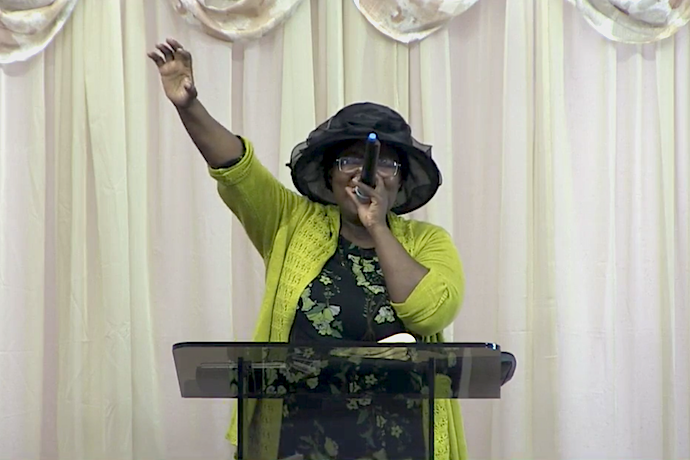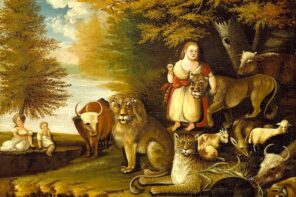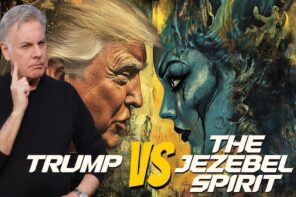Dr. Stella Immanuel received considerable attention after President Donald Trump retweeted a video where she recommends the use of hydroxychloroquine and asserts that masks are unnecessary to halt the transmission of COVID-19. More information about the actors who funded the video retweeted by Trump has also been uncovered. But what’s been a major source of concern for many are some of Immanuel’s beliefs and ideas about “demon sperm,” “demon sex,” and “generational curses.” The reaction to Immanuel’s claims was so overwhelming that #demonsperm trended last Tuesday on Twitter and some media outlets are now calling her “Dr. Demon Sperm.”
Now, Immanuel’s beliefs sound completely outlandish, as those of someone who has lost touch with reality, but why does she believe such ideas and from where do they originate? To have a better sense of what this means, one can get a clue through the teachings of the pastor she sees as her “spiritual father,” Daniel Kolawole Olukoya (DKO), founder of Mountain of Fire Ministries (MFM) in 1989 and based in Lagos, Nigeria. In the biographical note about DKO on the MFM website, his ministry is said to be “heavily influenced by the work of the late Apostle Joseph Ayodele Babalola,” founder of the Christ Apostolic Church (CAC), and that DKO’s father had also been a pastor with the CAC. The CAC was created in 1941 after the expansion of the “Aladura” (meaning, “praying people”) movement through a revival in the 1930s. The CAC is now the largest African-indigenous Pentecostal Church in Nigeria.
As a transnational movement, DKO’s MFM currently has branches in Europe (164), mainly in the UK (124), Ireland (14), Germany (12), France (8) and Spain (6). In the United States one can find 33 MFM churches scattered among the cities of Atlanta, Baltimore, Berkeley, Chicago, Fresno, New Jersey, Philadelphia, Oakland, Sacramento, and San Jose, just to name a few. Dr. Immanuel’s blog contains numerous references to DKO’s ministry, books and teaching. To summarize briefly, DKO’s teaching emphasizes the idea of destiny and preventing evil supernatural forces from destroying one’s life.
Some of the major spiritual opponents one encounters are witchcraft (operating through witches), “spirit” spouses (involving a “spiritual marriage”), curses (often brought about through ancestors), and marine spirits (often associated with women and sex). DKO teaches that spiritual forces are the primary cause for people’s problems, such as divorce, poverty, sickness, lack of success, marriage problems, rejection, etc. Spirits are responsible for everything that happens in one’s life. Christians need to be aware of Satan’s tactics against them and how to be victorious through “spiritual warfare.”
As Lenny Lowe pointed out here on RD, this worldview is shared by many in the Majority World. In an article written in 1982, Paul G. Hiebert was of the opinion that Christian missionaries from North America and Europe who were sent to Majority World countries were unprepared to face the spiritual worldview of indigenous populations. According to Hiebert, North Americans and Europeans operate with what he called a Western Two-Tiered view of reality, the upper-tier being the world of “religion” (faith, miracles, other-worldly problems, the ‘sacred’) and the bottom-tier of “science” (sight and experience, natural order, worldly problems, the ‘secular’).
Hiebert believes that people in the West have a blind-spot: the “excluded middle,” this third-tier “spirit world” of most individuals in the Majority World. This third-tier would be the world of spirits, ancestors, witches, curses, ghosts, etc., and would profoundly affect the daily lives of people. For Hiebert, the majority of individuals in the Global North adopt a worldview based on science and empirical data, and consider those who believe in an unseen world affecting the course of everyday life to be superstitious.
Now, for Immanuel, there’s no division between the spirit world and the visible world; same thing for Olukoya and many Pentecostals in African indigenous churches (AIC). Allen Anderson’s important ethnographical work on the “spirit-filled world” of sub-Saharan AICs, clearly shows their continuous-discontinuous relationship with African traditional beliefs and practices. For Anderson, Pentecostalism’s flexibility is what accounts for its success in many Majority World countries. When people convert to Pentecostalism, a cultural transformation and break from the past occurs, in discontinuity with some aspects of a given culture. At the same time, Pentecostalism also maintains some elements of continuity within the social context.
Anderson notes that for many Africans Pentecostals, traditional beliefs and practices about the “spirit world”—ancestors, curses, evil spirits, nature spirits, witch familiars, etc.—undergo a translation into the biblical categories of “evil spirits” and “demons.” There is, therefore, continuity and discontinuity in the belief in the “spirit world”; continuity, because the “spirit world” isn’t dismissed; discontinuity, because there’s now no need to fear these “evil forces” which can be defeated with the help of the Holy Spirit. In this context, Pentecostalism takes Hiebert’s “excluded-middle” seriously.
When Immanuel speaks of “spirit wives and husbands,” “demon sex,” “witches,” “generational curses,” etc., and their effect on people’s lives, this corresponds to what Birgit Meyer identifies as a process of diabolisation where the Devil absorbs the old spiritual beings. The activities of the “spirit world” now sound like one of the interpretations of Genesis 6:1-4 about the “sons of God” having sex with women, or its more developed tradition in 1 Enoch 6-11.
But the idea of “demon sex” also caught the attention of the media in 2011, when the late C. Peter Wagner, former professor at Fuller Theological Seminary School of World Missions and founder of the New Apostolic Reformation in 2001, said that the Japanese economy suffered a severe blow because the emperor of Japan had sex with the sun goddess, the chief “spiritual ruler” or principality over the nation. As a professor of missions studying the growth of Pentecostal churches in the Majority World, Wagner eventually adopted Hiebert’s “excluded-middle” worldview which led him to write numerous books on “spiritual warfare.”
In “spiritual warfare” language, some Neocharismatic-Pentecostals point to the biblical text of Ephesians 6:12 to explain how “principalities and powers” are demonic forces that control geographical regions across the world. Christian author Frank Peretti has tried to capture the idea of “spiritual warfare” in his novels This Present Darkness and Piercing the Darkness. Wagner, for his part, systematized “spiritual warfare” as a battle fought on three levels: 1) ground-level spiritual warfare (exorcisms; deliverance ministries, etc.); 2) occult-level spiritual warfare (demonic forces related to satanism, witchcraft, the occult, astrology, shamanism, etc.); and 3) strategic-level spiritual warfare (principalities and powers, territorial spirits over cities, nations, religious allegiance, etc.).

Screen shot of Paula White-Cain praying for victory over enemies. For $229. Image: RightWingWatch.org
The political implications of Wagner’s “spiritual warfare” ideas also got the attention of the media in 2011. In response to an NPR article on the NAR’s “spiritual warfare” and political aspirations, Wagner explained the beliefs and practices of the movement and said that its roots “go back to the beginning of the African Independent Church Movement in 1900, the Chinese House Church Movement beginning in 1976, the U.S. Independent Charismatic Movement beginning in the 1970s and the Latin American Grassroots Church Movement.” Even now, in the Trump era, we often hear “spiritual warfare” rhetoric used by people who support the president such as Paula White-Cain, in her reference to “satanic pregnancies” or her “warfare” prayers at Trump rallies and other events.
People can believe what they want, but such a worldview becomes a problem when it espouses and promotes ideas that are a threat to public health and safety. We’ve seen how some Neocharismatic-Pentecostal preachers challenged confinement regulations due to COVID-19, putting their own church members and the general public at risk. When people attribute illnesses to demons, seeking to heal people through “deliverance” and “spiritual warfare” techniques, the general public and media have serious reasons to be concerned.
We’re also noticing how such a worldview now bleeds into the political sphere, when some demonize their political adversaries and define the next U.S. election in terms of “spiritual warfare.” As we approach the 2020 U.S. elections, expect more polarization and references to the “demonic” on the part of “spiritual warfare” warriors. Another good reason for all who embrace pluralism to be alarmed.





